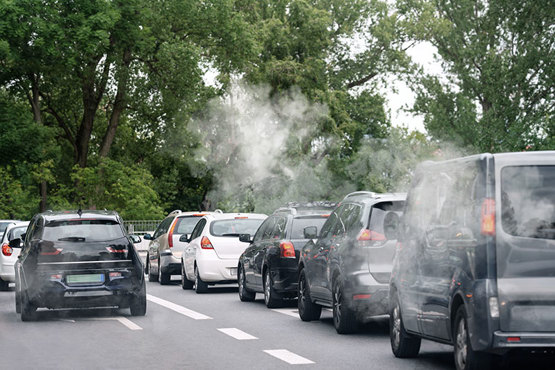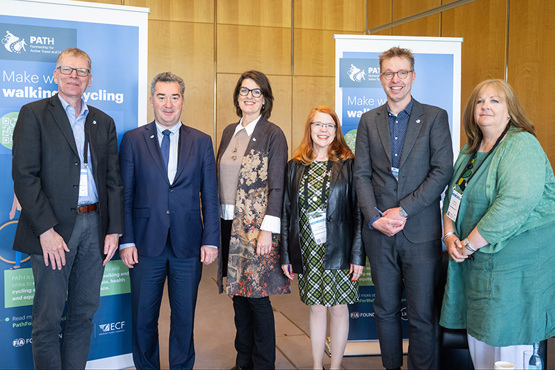1.9 million premature deaths preventable with better traffic emission policies by 2040, says new FIA Foundation supported study

1.9 million premature deaths and 1.4 million childhood asthma cases are preventable by 2040, says a new study by the International Council on Clean Transportation (ICCT), the George Washington University, and University of Colorado, Boulder, supported by the FIA Foundation.
The global analysis demonstrates dramatic health benefits from combining emission standards, electric vehicles, accelerated fleet renewal, and clean electricity for electric vehicles. The impact would be to protect 1.9 million lives, which translates to preventing 310 premature deaths and 230 new childhood asthma cases every single day over the next 15 years.
The research, ‘Global health benefits of policies to reduce on-road vehicle pollution through 2040’, models the impact of strong health policies across more than 180 countries and 13,000 urban areas. By assessing the health impacts of various policy measures, including Euro 6/VI equivalent emission standards, Euro 7-equivalent standards, an accelerated transition to electric vehicles, and accelerated fleet renewal, the researchers were able to show how combining these policies with clean electricity generation for electric vehicles would maximise health benefits.
Key findings include:
- Road transport emissions are responsible for an estimated 252,000 new asthma cases in children in 2023.
- Without further policy action, health disparities across regions will widen significantly. The study projects premature deaths, years of life lost, and new asthma cases in children from road transport emissions will approximately double in the least developed countries from 2023 to 2040, while decreasing in high-income countries.
- Combining Euro 6/VI standards with electric vehicle policies is highly complementary, avoiding an additional 323,000 premature deaths and 419,000 new asthma cases in children globally compared to focusing on electric vehicles alone.
- Ensuring electric vehicles don’t increase electricity grid emissions by decarbonising generation could prevent an additional 212,000 premature deaths and 98,000 new asthma cases in children, compared to implementing vehicle-related policies alone.
“Our research demonstrates that policy choices made today will have profound implications for public health outcomes through 2040 and beyond," said Lingzhi Jin, lead author from ICCT. "The data clearly shows that implementing complementary policy measures—particularly Euro 6/VI standards alongside an electric vehicle transition—delivers substantially greater health benefits than single-policy approaches."
"A strength of this study is our ability to assess policy impacts at a granular level across the entire globe," said Dr. Daven Henze, co-author and Professor at the University of Colorado Boulder. "By combining advanced atmospheric modelling with high-resolution satellite data, we've created a powerful tool that shows not just where pollution is concentrated, but how different policy choices could improve health outcomes in specific communities, down to the square kilometer. This represents a significant advancement in our ability to guide informed policy decisions."
The study reveals concerning disparities in health impacts across regions and age groups. Children under 5 years old are projected to account for 50% of avoidable new asthma cases in children from NO2 exposure, while making up only 25% of that broader age group. Similarly, adults aged 65 and older account for 70% of global avoidable years of life lost while making up just 20% of the total adult population.
"Our research reveals an important opportunity to improve health for kids and adults by reducing harmful pollution in the air they breathe," said Dr. Susan Anenberg, co-author and Professor at George Washington University. "Vehicle tailpipe pollution contributes to asthma development in children and increases cardiovascular and respiratory risk among adults. We urgently need coordinated global action to ensure all communities, especially those most at risk, benefit from cleaner transportation."
The research also highlights the special vulnerability of urban populations to road transport-related air pollution. Urban areas account for two-thirds of avoidable new children's asthma cases globally despite housing only one-third of the world’s children.
"The evidence from this study is crystal clear: implementing a strategic combination of emission standards, electric vehicle policies, accelerated fleet renewal, and clean electricity generation will save nearly 2 million lives globally over the next 15 years," said Sheila Watson, Deputy Director of FIA Foundation, a co-funder of the work. "Policymakers must act on this evidence now in order to protect public health. This isn't just about environmental protection—it's also about saving lives and improving children's health on a massive scale."



